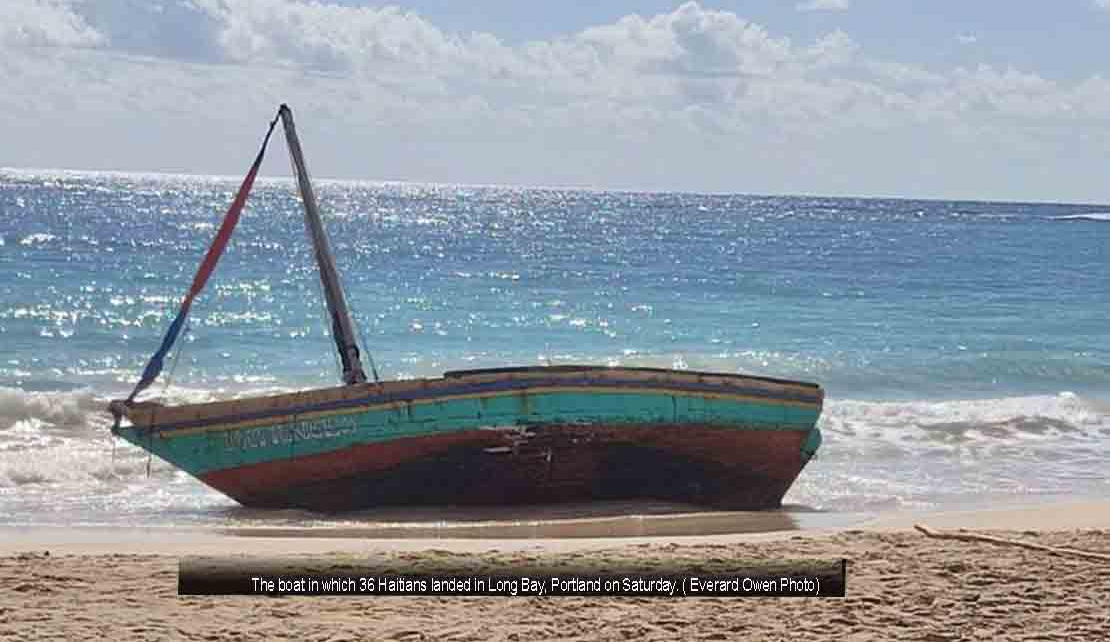JAMAICA | Refugees who landed in Jamaica on Saturday sent back to Haiti

MONTEGO BAY, Jamaica September 11, 2023 - The thirty six Haitians refugees who arrived at Long Bay in Portland by boat just after 6:00 am on Saturday morning, have been sent back to Haiti under the cover of darkness.
The government returned 36 Haitians to their homeland early Monday morning, just two days after they arrived by boat. In a release, the Ministry of National Security said the Haitians, who had arrived by boat, were safely returned home on Monday morning.
This move by the Jamaican Government is in contravention of the policy of non-refoulement signed by Jamaica and should be adhered to under the country’s treaty obligations of the 1967 UN Refugees convention.
The principle of non-refoulement is one of the most important principles in the Refugee Convention. It requires (a) that countries do not send refugees to a place where they will face a well-founded fear of persecution, nor to any other country that might send them to such a place.
(b) Providing refugees with a legal status, including rights such as access to employment, education and social security;
(c) Not punishing refugees for entering ‘illegally’ – that is, without a passport or visa.
The ministry said it became aware of the group’s arrival and consequently mobilised through the Jamaica Constabulary Force and Passport Citizenship and Immigration Agency, in partnership with the Ministry of Health and Wellness, the necessary measures to see to their safety and welfare needs.
“Following the completion of our immigration checks and security vetting, the group was denied entry. From the vetting process it was found that there were members who had been previously removed from Jamaica for breaches of entry,” the ministry said.
The Haitians, comprising 18 men, seven women and 11 children, including four babies, landed at Long Bay in the north eastern Jamaica parish of Portland just after 6:00 am, Saturday morning.
The Portland police said shortly after their arrival, representatives of the Passport Immigration and Citizenship Agency [PICA] and an interpreter would be arriving shortly to process them.
It said it was in dialogue with the Government in Haiti and arrangements had been made with the relevant authorities in Haiti to facilitate the group’s safe return
Then came news on Monday morning that the Haitians had been “safely returned” to their homeland.
On July 10 another group of Haitians, 37 in number, arrived in Jamaica, and with support from various interest groups, were assisted to apply for asylum. Those applications are currently being reviewed.
Under the Refugee Convention, who is a refugee?
Article 1A (2) of the Refugee Convention sets out the international legal definition of a refugee. It defines a refugee as a person who:
(a) has a ‘well-founded fear of being persecuted for reasons of race, religion, nationality, membership of a particular social group or political opinion’;
(b) ‘is outside the country of [their] nationality’; and (c) ‘is unable or, owing to such fear, is unwilling to avail [themselves] of the protection of that country’.
The idea of ‘persecution’ is not defined in the Refugee Convention, but it has been understood as involving threats to life or freedom and other serious violations of human rights.
It may also include social, political or economic discrimination, and can result from a single incident or cumulative incidents and conditions.
Refugees are given a special status in recognition of the fact that they have lost the protection of their own country.
According to the Refugee Convention, refugees ought to be afforded a range of rights as soon as they arrive in a country seeking asylum.
These rights include, but are not limited to, the right to non-discrimination (article 3), the right to work (article 17), freedom of religion (article 4), the right to housing (article 21), the right to not be penalised for illegal entry (article 31), the right not to be expelled from a country unless the refugee poses a threat to national security or public order (article 32), and the right not to be sent back to a country where their life or freedom would be threatened (i.e. the principle of non- refoulement) (article 33). Conversely, article 2 of the Refugee Convention requires that refugees abide by the law in the country that grants them protection.
-30-
